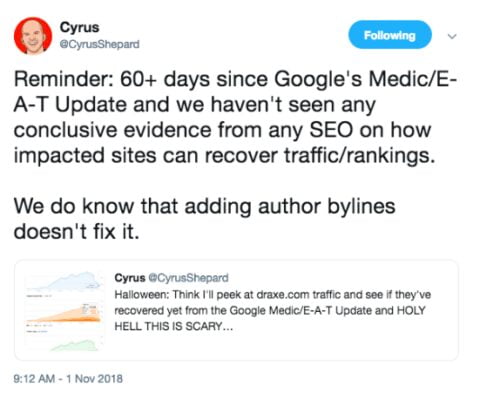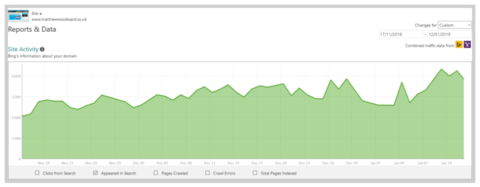It has become almost disastrous lately having Google as your only traffic source.
Traffic can be wiped out in an instant, taking all of your years of effort and SEO away with it overnight.
Maybe not disastrous, but it is definitely a risky option.
Should you really rely on Google when they are having regular issues such as a Google indexing bug that hasn’t been entirely fixed yet?
This bug was first reported in April on Search Engine Journal by Matt Southern.
It was also reported on in August (yes, last month) on Search Engine Journal.
One of the latest Google core updates late last year destroyed rankings for many SEO professionals, and it took many more than 60 days to crack the algorithm (which was highly unusual):
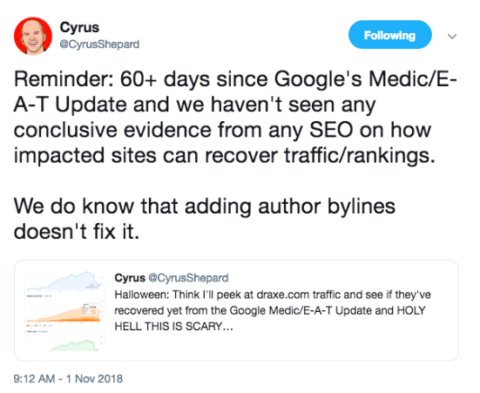
Eventually, a case study finally appeared.
Despite all of your best intentions, you could be hit with a penalty for something that happened over five years ago.
One SEO found out they were hit with a manual action, even after they haven’t engaged in any manual link building for five years.
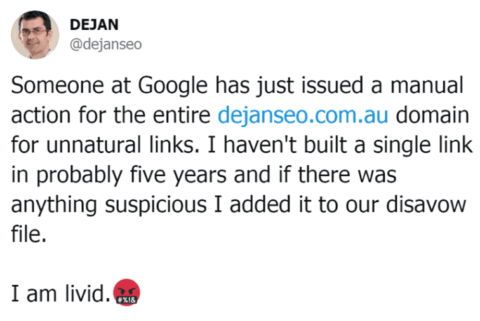
It only makes sense to diversify and strengthen your foundation of traffic sources, just in case you end up actually getting hit by a manual action on a random whim.
These seven sources can be key to overcoming a potentially disastrous situation.
1. Produce Video Content & Promote It On YouTube and Through Press Releases
When you produce video content, you create content that is highly engaging and has the capability of driving significant traffic to your site.
With more than 1 billion users, YouTube as a source of traffic should not be ignored.
While it is owned by Google, if you suffer a manual action or algorithmic downgrade on Google, YouTube traffic being sent to your site should not be affected.
Shifting your focus from your website’s text content to producing video content (or producing both as a balanced activity) should help create another traffic stream to your site while you work to overcome the manual action.
Then, promoting the video content via press releases should help promote it and drive other traffic to your site in the interim.
Also, don’t forget your email list. Sending out a promotional email to your list every time you publish a video will help drive traffic to your site also.
2. Get Traffic From Other Search Engines Like Bing and Yahoo
You may have heard the argument before, as mentioned by Matthew Woodward on his site:
“Since 1998 SEOs have purely focused on ranking sites in Google.
That’s two decades of focus on one platform!
This has made Google’s search market results highly competitive.
In that time Bing has been largely ignored.
And SEOs write off trying to improve their Bing rankings by saying…
“If you rank well in Google you’ll also rank well in Bing”.
But is that the case?
Well… not quite:
Their algorithms are remarkably different.
Just compare results for the same term and you will quickly see what I mean.
It’s important to understand those key differences.”
Woodward’s great graphic here goes over the different Bing ranking factors you should pay attention to, and you should not ignore:
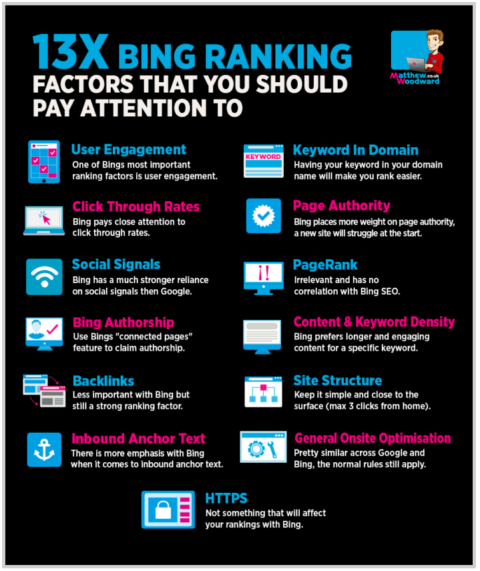
Because Yahoo search is powered by Bing, if you work on these, you will be able to get some competitive advantage on Yahoo as well.
Creating other foundations with other search engines can only mean that Google won’t destroy all of your traffic.
Kasia Perzynska of LiveChat, Inc. has this to say about optimizing for Bing and Yahoo, on several different fronts. I apologize for the longer quote, but she has some great insight on Bing optimization:
“Technically, all search engine algorithms are based on analyzing keywords and the number of high-quality backlinks. However, while Google favors the popular sites, Bing ranks older domains much higher and includes more official endings such as .edu, .gov.
This means that Google is sensitive to the dynamically changing trends to display the most relevant information to a searcher. On the other hand, Bing gets more traditional here and simply ranks information from the older and more authoritative domains higher.
Also, Bing favors websites that have plenty of unique content. It should be engaging but can get shorter than Google demands. Bing puts significantly less weight to the quality of backlinks while calculating the position in SERPS.
Local search
You can observe some further differences between Google and Bing while checking up on local search results. In practice, Bing’s local results get more local than on Google. In fact, while Google tends to promote more popular and larger websites, with Bing it’s easier to rank with your small, local business.
On-page optimization
Google is smarter than Bing.
On-page optimization on Google has been taken to the next level some time ago. While Google deploys AI, understands the context and is constantly under improvement, prioritizing for user’s intent, Bing is still old school and far behind.
Being less intuitive, Bing relies heavily on keywords and with its strict optimization rules, is actually easier to handle. Place your target keywords strategically, making sure it’s included within your URLs, title tags, headlines, meta descriptions, frequently within the page’s copy and you’re all set.
I’ve also found that, contrary to Google, meta tags are still important for Bing SEO. Furthermore, meta tags are said to be a strong Bing’s ranking factor and can massively increase the overall ranking of a website.
Backlinks
According to Searchmetrics research, the number of backlinks matters for site’s ranking on Bing and the correlation is about .29 to how a site ranks. Also, most links among the top 30 Bing results contain a target keyword in the anchor and around 2% of backlinks include the stop word. This means, that the quantity of backlinks trumps the quality of backlinks on Bing.
Bing loves organic backlinks coming from the old and authoritative domains like, in particular, .edu and .gov.
Here is the official Bing’s statement about backlinks importance for search ranking:
Links pointing to your site help Bing discover new pages on your site. Traditionally, it is also regarded as a signal of popularity. The site linking to your content is essentially telling Bing that they trust your content.
Competition
Another Bing SEO advantage is the fact that most search marketers focus on Google, so Bing has lower competition on its playground.”

3. Drop Meaningful Comments on High Traffic Sites in Your Niche
No, I don’t mean the age-old spammy technique of constant blog comments and trying to game Google through thousands of spammy backlinks.
Instead, I do mean adding meaningful, high-quality comments to high authority sites in your niche.
What used to happen, back in the olden days, is that black hats would use programs like Scrape Box and X-Rumer to build hundreds of thousands of blog comments overnight.
The method of doing blog comments has changed, as has links.
Should you never do blog comments? No.
That being said…should you never build links? No…
So, what – should you never build links? No, not quite…
In recent years, it has been revealed that Google’s Webmaster Guidelines considers any link built by you manually to be spammy, regardless of its nature. If it is created by you, and is non-editorial, it is spammy and unnatural.
While I am well aware that some SEO professionals disagree, and will continue building links manually until the day they die, John Mueller says:
“So basically on the one hand that involves some amount of self-promotion from your side like you have to get some people to come and visit your website somehow so that they can recognize that this is actually a good website.
And there are lots of ways that you can do that. And then that also involves one of those people or some of those people going well, this is a really fantastic website and I have another website that I can link, from where I can link to your website.
So it’s not the case that every visitor coming to your website will say it’s a fantastic website and I also have a website and let me link to your website from my website, but some of these people they can.”
Which brings us to our next traffic source: legitimate forum discussions.
Wait a minute…I thought forum discussions were bad?

4. Spammy Forum Discussions Are Bad, But Legitimate Forum Discussions Are Good
If you continue to spam forums and put your link in every exact-match keyword anchor text occurrence there is, don’t be surprised that you will eventually get caught.
However, if you legitimately drop your link on discussion forums, that’s not a bad thing.
It can be a great traffic builder when done right.
It is similar to blog comments, in that what SEO pros have done in the past is spam forums relentlessly, constantly churning out link after link in contextually irrelevant discussions.
This method of forum discussions sucks – and is not something you want to do.
But, if you do forum discussions right – and use branded anchor text, naked URLs, and natural, non-keyword-targeted anchors, and you participate naturally in contextually-relevant discussions, this can be a great traffic booster.
However, be warned – nobody likes a spammer, so don’t just randomly start posting on forums in an attempt to increase your traffic.
You could end up getting banned just for that alone. So be sure to abide by forum rules and posting etiquette – this will go a long way toward establishing yourself as a reliable forum member.

5. Create Podcasts, Radio Shows, and Use Audio Content to Boost Your Traffic
Using podcasts can be a tremendous boost in your traffic in other ways, as Ashley Segura (Ward) lays out in her post: 10 Reasons Why You Need to Add Podcasts to Your Content Strategy:
“Packed with information and the perfect sprinkle of entertainment and light-hearted banter, podcasts are incredibly engaging and a useful medium for businesses and listeners alike. They are the sleeping giant of content types, though.
Most businesses don’t understand the true potential behind podcasts. And there’s a huge number of reasons why they are the perfect addition to any existing content strategy.”
She also mentions 10 reasons that make this a great traffic source:
- Podcasts have low competition.
- They are engaging and convenient for listeners.
- They are yet another mobile-friendly content option.
- They are consistently growing in popularity.
- Podcast audiences are loyal and passionate about their industry/topic.
- There are usually interactive options available for the audience.
- They help you establish thought leadership in your industry (further increasing the all-important E-A-T factors required in today’s SEO).
- You also have the opportunity to grow a loyal traffic base by publishing your podcast content consistently.

6. Any Traffic Source That Lets You Take Advantage of User-Generated Content to Boost Your SEO
User-generated content can take many forms. We’ve already discussed a few of those forms in this guide, such as legitimate forum discussions and non-spammy blog commenting.
Raj Nijjer goes into further detail in his article – 5 Ways User-Generated Content Can Boost Your SEO.
The idea behind this kind of content is to make sure that you take advantage of all the potential organic traffic sources available to you in this regard in the form of:
Review sites are a big one in this vein.
These include sites like:
- Google My Business
- Amazon.com
- Yelp.com
- TripAdvisor.com
- Yellowpages.com
- BBB (Better Business Bureau)
- Manta.com
- Foursquare.com
All of these sites cater to reviews and help you increase the value of your reputation through user-generated content.
As you increase your E-A-T (expertise, authoritativeness, trustworthiness) through reviews, and higher quality implementation of this user-generated content, the more traffic you will receive from these traffic sources.

7. Build An Email List That You Can Contact Every Time You Create Meaningful Content
You do have ways of capturing all of your visitors’ emails as they land on your site, right? Such as a newsletter subscribe button?
Anytime you create a brand-new piece of content and promote it, if you have your email list, you can send out your content to your list and drive that traffic to your site.
It’s not exactly organic traffic – but it is direct traffic, and this will still show up as traffic in your Google Analytics, leading to an increase in your overall traffic.
It is yet another great foundation that you can take advantage of to really reign in your different traffic sources if Google ever goes south.
Check out this post on how to take advantage of email marketing as yet another varied source of traffic.

Google Will Continue to Update Their Core Algorithm & There Is Nothing We Can Do to Prevent This
Before the advent of Google’s algorithm updates, and not quite as much competition, it was easier to really hone in your skills and increase organic traffic.
It was downright easy.
However, nowadays things have changed. It is almost guaranteed that you will be impacted by a major upcoming algorithm update.
This is especially true if you partake in any shady practices designed to artificially inflate your rankings.
You definitely do not want to do that.
But, there are legitimate ways to create multiple foundations that will help you survive the almost gut-punching overnight loss in traffic that happens when Google finally hits your site.
As long as you have these foundations, you won’t have to worry about what will happen when Google smacks down that penalty.
Diversifying your strategies by building multiple sources of traffic is a smart move to make in this risky SEO climate.
I have a favorite saying that applies to this situation: the only sure things in life, are death, taxes, and Google algorithm updates.
Why not mitigate your risks from the start by diversifying your foundations?
More Resources:
Image Credits
All screenshots taken by author, September 2019
